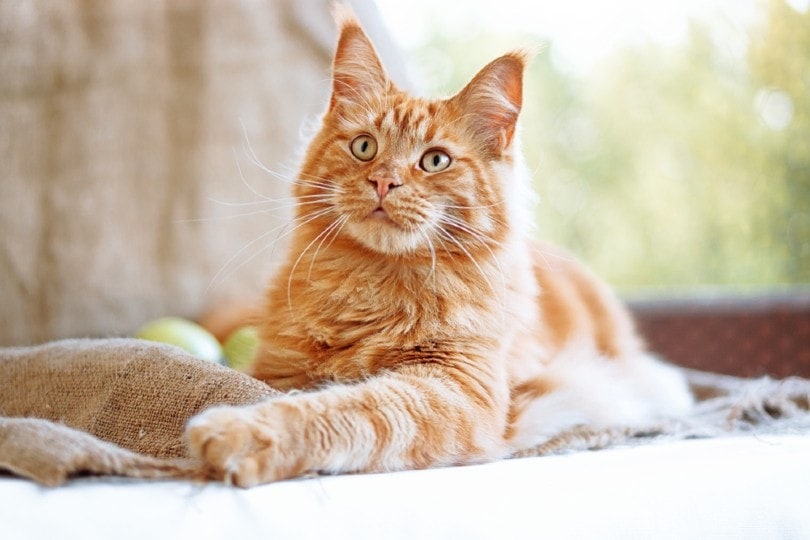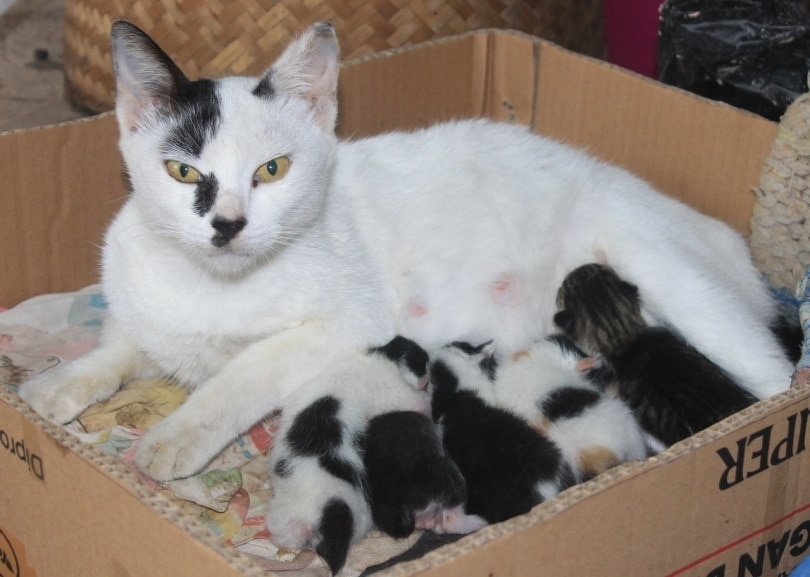Why is My Cat Dry Heaving? Vet-Approved Reasons & What to Do
Updated on
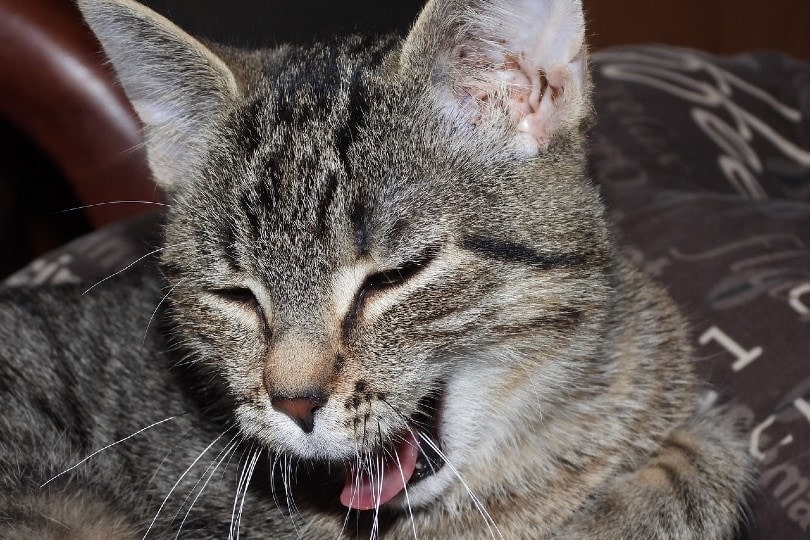
If you’ve owned a cat for just about any period, you’re likely familiar with the distinct sound of a cat trying to throw up. The horrible gagging sound that accompanies dry heaving and vomiting seems to happen most frequently around 2 AM and only seems to take place on your bed or some expensive textile or piece of furniture.
Dry heaving is essentially the gagging and heaving that occurs before a cat throws up, but without the cat actually throwing anything up. If this happens only once or every now and then, then it’s likely nothing to be concerned about. If it happens frequently or is a new problem, then you should likely begin looking into the causes of your cat’s dry heaving. Here are some of the reasons that your cat may be dry heaving.
The 14 Reasons Why Cats Dry Heave:
1. Nausea
There are a ton of reasons that a cat may be nauseated, whether it’s from disease, medication, or food. Some cats may have a sensitive digestive system, causing nausea and vomiting when they eat something that irritates their stomach. Even pregnant cats may experience nausea, although this isn’t thought to be as common in cats as it is in humans. Regardless of the cause, if your cat is dry heaving, they are nauseated. When this happens, it’s important for you to start ruling out causes to get to the bottom of the issue.
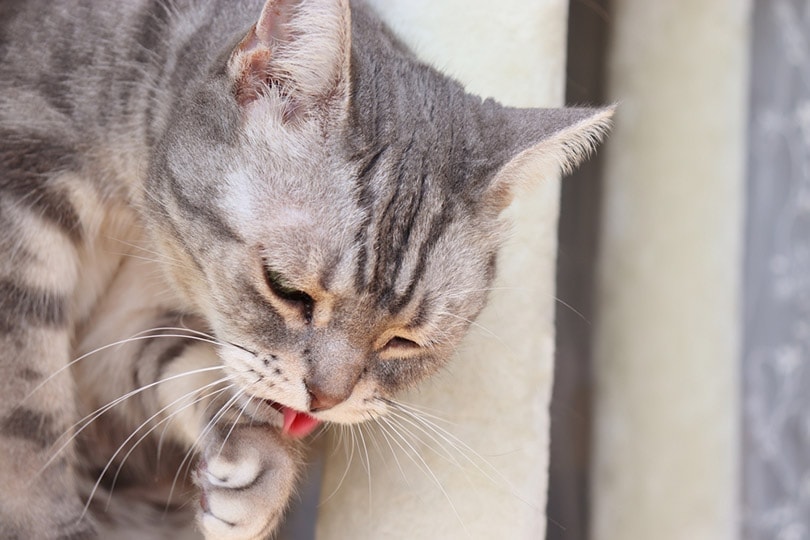
2. Hairballs
Cats are widely known to be fastidious groomers, usually bathing themselves multiple times per day every day. To help them groom more effectively, cats have small hooks on their tongues, almost like Velcro, that help them remove loose hair, dander, dirt, and debris from their coat. While this helps your cat get nice and clean, it can also help your cat swallow a lot of hair. In general, cats are able to successfully pass the consumed, indigestible hair out the other end, but some may remain in the stomach and eventually form into a wet clump – a hairball.
Some cats may never get hairballs, some cats may get them once or twice, and some cats may get them somewhat routinely. When your cat has a hairball, the hair in the stomach cannot pass out of the stomach the proper way, so it has to be thrown up, which can lead to dry heaving in cats that are attempting to pass a hairball. Some cats are more prone to hairballs than others, particularly long-haired breeds and those that are very fastidious groomers.
There are a variety of over-the-counter medications, supplements and even cat foods that can help reduce the frequency of hairballs. In general, vomiting hairballs more than once or twice per week warrants a vet visit to rule out any serious medical conditions. If a cat’s dry-heaving to bring up a hairball is accompanied by other worrying signs such as lethargy or lack of appetite, a vet visit should be arranged urgently.
3. Gastroenteritis
Gastroenteritis is a condition in which the lining of the stomach and intestines is inflamed, which results in digestive upset, like vomiting and diarrhea. Although viral gastroenteritis is the most common, this type of irritation to the digestive tract can be caused by many things, including bacterial infections and parasites.
It’s not uncommon for cats with gastroenteritis to vomit yellow, foamy bile or even vomit with thick mucus in it. Oftentimes, owners will see their cat dry heaving after eating or drinking, although they may also dry heave in the presence of food if it’s offered to them while they’re nauseated.
Depending on the cause and severity, gastroenteritis may require treatment. For viral gastroenteritis, the treatment is usually supportive, whereas bacterial or parasite-related gastroenteritis have more specific treatment options. Maintaining hydration and controlling nausea, vomiting and diarrhea are the most important aspects of medical support. If you suspect that your cat might have this condition, a vet visit is in order. Even if your cat has a gastroenteritis infection that can’t be treated directly, supportive care can be provided and can help speed up their recovery.
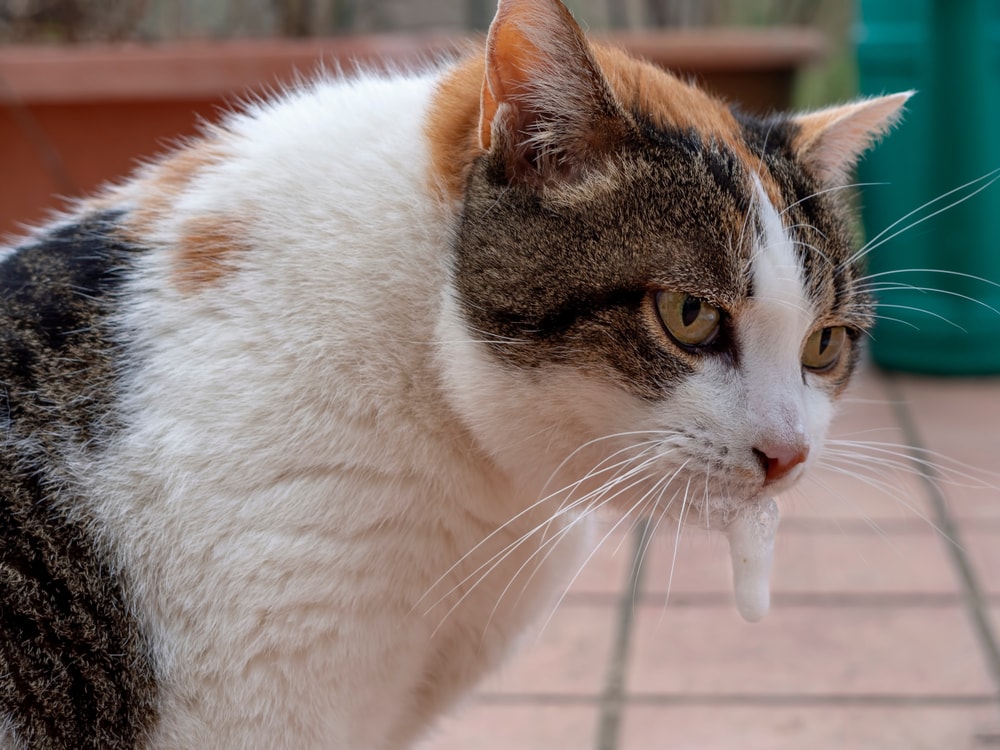
4. Intestinal Foreign Bodies
Although dogs are typically the pets that consume things they shouldn’t, cats can also be culprits of this and in some cases, it can result in an intestinal blockage. If your cat consumes an inedible item, like hair ties, cat toys, or pieces of cotton stuffing, then they may not be able to pass the item through their digestive tract. In some cases, your cat may vomit the object up, but in others it may pass into the intestinal tract which can lead to a blockage.
When the intestines become blocked, digestive fluids and anything your cat eats is prevented from passing through. When this occurs, nausea, vomiting, and abdominal pain will occur due to the digestive backup. If you suspect your cat has consumed a foreign object, they should be seen by a vet immediately.
In some instances, foreign bodies can only be fixed through emergency surgery. It’s important that you don’t attempt to make your cat vomit at home without veterinary guidance, even if you saw them consume an inedible item.
5. Intestinal Parasites
Parasites are an unfortunate reality when it comes to owning pets. Even for indoor cats, parasites can be picked up through things that come into the home, like fleas and animal waste tracked in on a shoe. There are many parasites that cats can get, and a handful of them take up residence in the digestive tract, like tapeworms, roundworms, and hookworms. Of course, having an infestation of worms in the digestive tract can lead to nausea and discomfort, which can then lead to dry heaving.
With heavy parasite infestations, you may even notice worms in your cat’s vomit. This is especially common with severe roundworm infections. While worms are treatable, it’s important that you have your cat checked over by your vet. It’s also a good idea to talk to your vet about how to prevent these infections in the future.

6. Toxin Exposure/Poisoning
There are many things in the average home that are dangerous for cats, including plants, cleaning chemicals, pesticides and some foods. While items that are toxic to cats should always be kept where they can’t be accessed by your cat, accidents do happen. Your cat may find some leftover mouse bait from the previous tenants, or a door may be left open to a room with toxic plants.
Regardless of the cause, if you suspect that your cat has been poisoned or exposed to toxins, then you need to contact a vet immediately. A pet poison helpline is a great resource that can help you determine the potential severity of the poisoning, as well as provide guidance to your vet on treatment. If you see or suspect that your cat has consumed or been exposed to something toxic, then you should contact a pet poison helpline while you’re on your way to the vet.
7. Diabetes
Diabetes is a disease that has risen in occurrence with the rise of pet obesity. Cats most commonly get Type II diabetes, and obesity is a predisposing factor. In Type II diabetes, the amount of insulin produced by the pancreas is insufficient, or delayed, or the tissues of the cat’s body are relatively insulin resistant. This results in an inability for the body to maintain appropriate blood sugar levels.
Insulin is administered via injection to replace the insulin that the body is no longer producing. If you don’t know that your cat is diabetic or if their medication isn’t properly managing their disease, then they can develop dangerously high blood sugar levels which can lead to a condition called ketoacidosis.
Ketoacidosis is a medical emergency, and it can, among other things, cause nausea, leading to dry heaving and vomiting. If your diabetic cat is vomiting or dry heaving, it’s best to contact your vet.
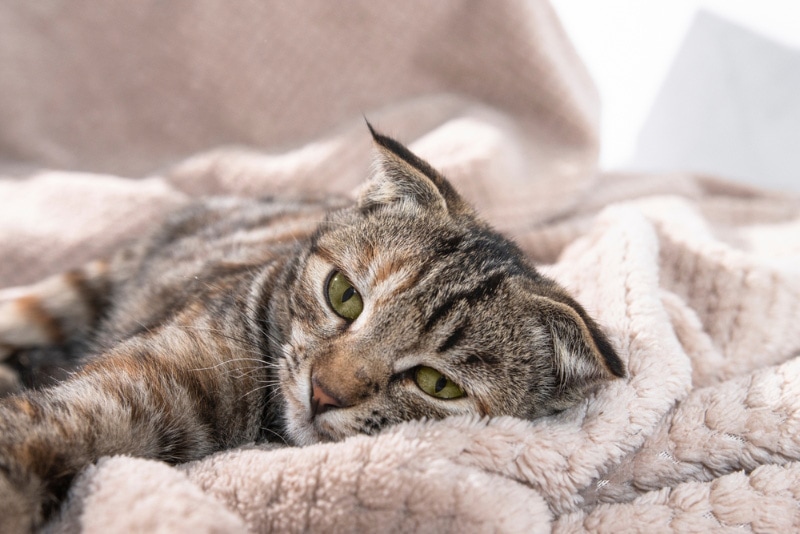
8. Hyperthyroidism
Hyperthyroidism is a condition that is caused by a functional (but not malignant) tumor of the thyroid gland, leading to the gland becoming overactive and producing high levels of thyroid hormones. This disease can be difficult to manage, and it’s extremely common in cats. Nausea is one of the unpleasant signs of hyperthyroidism, so dry heaving and vomiting in cats with this disease isn’t uncommon. Diarrhea, weight loss and an increased appetite can also occur.
If your cat has previously been diagnosed with hyperthyroidism and is suddenly experiencing an increased frequency of dry heaving and vomiting, then a vet visit is to ensure their medication is still working properly. Over time, your cat’s medication needs may shift, leading to a recurrence of the signs of hyperthyroidism.
9. Liver Disease
Liver disease can be caused by many things, from hepatic lipidosis (excessive fat accumulation in the liver, leading to liver failure), toxin exposure, pancreatitis, infections, tumors and other inflammatory conditions. The signs of liver disease can vary widely, but in some cases, your cat’s skin, mucus membranes, and the whites of their eyes can take on a notable yellow tone (jaundice). If you see this, it is a medical emergency, and your cat needs to be seen emergently by a veterinarian.
Other signs of liver disease include anorexia, abdominal swelling, weight loss, weakness, lethargy, nausea, and dry heaving. Nausea with liver disease occurs because a healthy liver is responsible for filtering waste products from the body. In a diseased liver, these waste products begin to build up, leading to nausea.
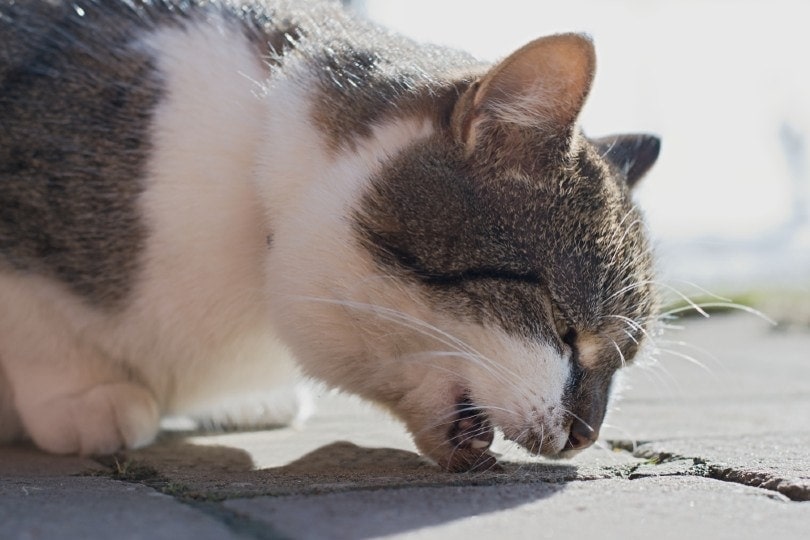
10. Kidney Disease
Kidney disease in cats is unfortunately a common condition. Acute kidney injury (AKI) can be caused by the ingestion of a toxin, most commonly antifreeze, that leads to the failure of the kidneys. Chronic kidney disease (CKD) is a more common condition and is seen frequently in middle-aged to older cats. Healthy kidneys perform many vital functions, including filtering the blood and making urine. When the kidney function depletes, there is a build up of waste products in the bloodstream, which makes the cat feel nauseous, lethargic and less inclined to eat. They therefore lose weight. Cats with kidney disease cannot concentrate their urine effectively, so they lose a lot of water in the urine, and therefore drink a lot to try to compensate.
Nausea, dry heaving and an increase in thirst could be signs that your cat’s kidneys are not functioning well. A blood test at the veterinarian alongside a urine sample will help diagnose the problem.
11. Inflammatory Bowel Disease
Just like humans, cats are capable of developing inflammatory bowel disease (IBD). IBD is a chronic medical condition that can impact any part of a cat’s digestive tract, and which part of the digestive tract is impacted can determine the signs your cat exhibits.
While IBD in the lower intestines may result in diarrhea, IBD in the stomach and upper intestine may lead to nausea, dry heaving, and vomiting. Weight loss, dull coat, and changes in appetite are often consistent signs of IBD, regardless of where the disease is located in the body. This condition can be managed with prescription medications, but it cannot be cured.
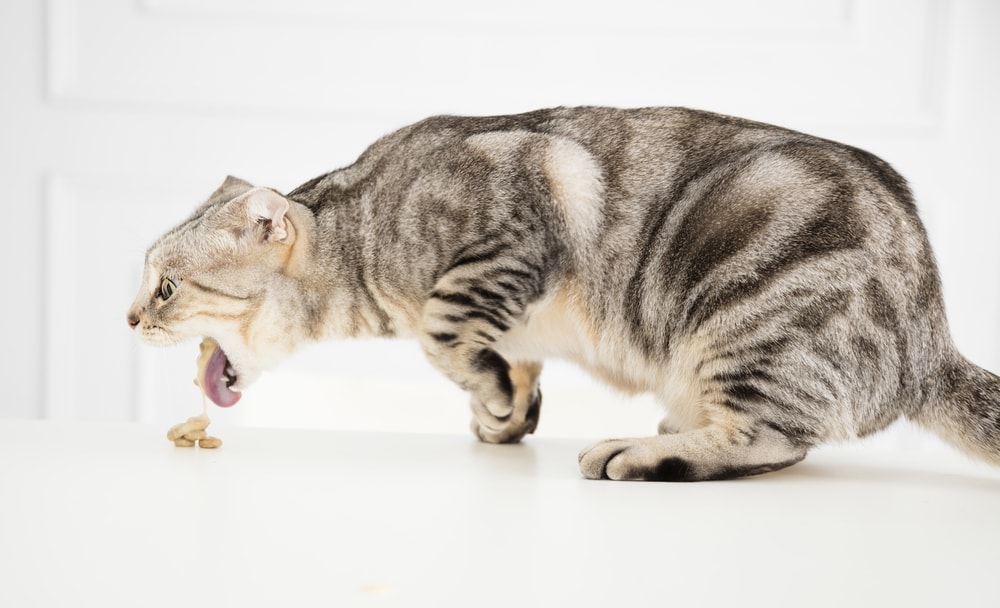
12. Anxiety
Some cats are anxious creatures that may feel threatened by seemingly small things, including changes in the household, the presence of other animals, unfamiliar visitors, and traumatic experiences. When cats feel threatened, they can develop anxiety, just like humans can. Anxious cats may begin to act unusually, with signs of anxiety including excessive hiding, increased vocalizations, aggression, changes in appetite, and vomiting. Some cats may exhibit dry heaving without successfully vomiting anything up.
If your cat seems anxious, then it’s important that you begin working to identify the cause. Some things can be changed easily, like providing your cat with a safe, quiet space of their own, but other issues may be more difficult to manage and may need intervention from a specialist, such as a veterinary behaviorist.
13. Asthma
Asthma is a medical condition in which the muscles around the airways constrict and inflammation occurs in the lungs and airways. As you might imagine, this inflammation and constriction leads to difficulty breathing. Other signs of asthma include wheezing, coughing, and chest tightness.
For cats with excessive coughing and wheezing, they may vomit or dry heave. Asthma can be managed with medications, but it’s extremely important for your cat to be evaluated by a vet if you notice any changes to their breathing patterns.
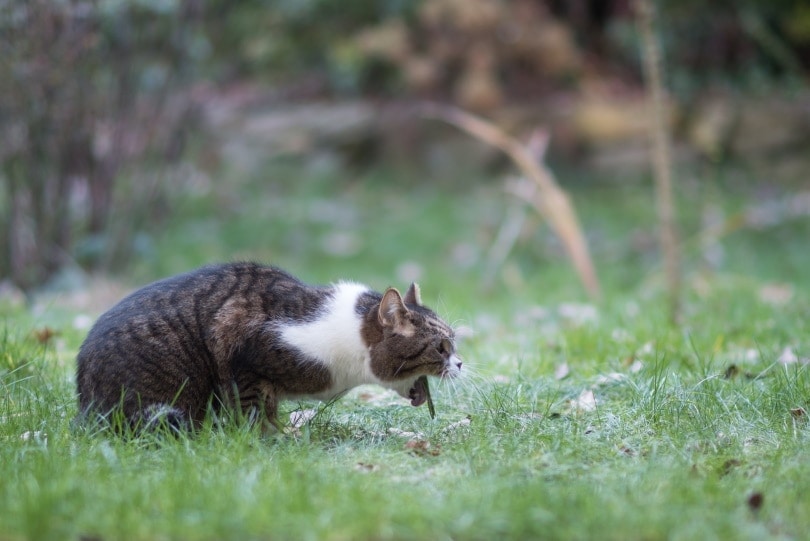
14. Respiratory Infections
Much like with asthma, respiratory infections can lead to dry heaving and nausea because of excessive coughing or wheezing. Infections of the respiratory tract can be caused by viruses, bacteria, and even fungi. While excessive coughing and wheezing can lead to dry heaving due to the sheer effort of trying to breathe, your cat may experience nausea from the cause of the disease itself, not just as a result of coughing and wheezing.
Loss of appetite, gagging, and dry heaving are all common occurrences in many types of respiratory infections in cats. Any breathing problems should always be investigated by a veterinarian as an emergency. When caught early, most respiratory infections are treatable, but the longer a condition goes without treatment, the more likely your cat is to experience a serious medical event.
Conclusion
There are a lot of reasons your cat may be dry heaving. Often, the cause is benign and of little to no concern. Other times, though, the cause may be very serious, leading to the need for medical or surgical intervention to get your cat healthy and help them feel well. It is important to monitor for other signs of illness if your cat is dry heaving.
If your cat regularly dry heaves, having a vet checkup is a great idea to ensure your cat is not experiencing a severe issue. Many conditions that can cause dry heaving are curable or treatable when caught early enough. However, waiting until your cat is quite sick to begin treatment can decrease the chance of your cat returning to a comfortable quality of life.
Featured Image Credit: Ada K, Pixabay



